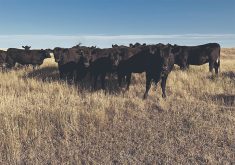Men eat more beef than women and worry less about following a diet.
Those tidbits of insight into consumers are used to build a loyal following for Canadian beef.
“Brand loyalty has a direct link to consumer spending, which will bring money all the way back to producers. We hope to measure that in the future,” said James Bradbury, brand officer with Canada Beef.
A wide ranging project surveyed stakeholders and ordinary beef consumers from Canada, China, Japan and Mexico. It was presented at the December annual meeting of the Alberta Beef Producers in Calgary.
Read Also

Beef check-off collection system aligns across the country
A single and aligned check-off collection system based on where producers live makes the system equal said Chad Ross, Saskatchewan Cattle Association chair.
The study showed those with better incomes eat more beef. Men aged 18-54 ate more beef than women.
Most beef is eaten at dinner time and many consider it a special occasion meal.
Those who responded to the survey were divided into groups based on their responses. Knowing where a consumer fits helps organizations develop more targeted marketing programs.
The largest group was defined as the Canada loyalist and tends to be women aged 30 to 54.
This person is proud of Canada and believes the cattle are healthier and the beef is better than that raised in the United States or other countries.
Beef is considered a quality food and they love eating it.
They expect to find Canadian beef in groceries and restaurants and they will buy a product if they know it is Canadian.
The next group is the hedonist who loves the taste of beef and tends to eat more and spend more than any other group. They prefer hamburgers and steaks.
Mexicans are the greatest beef hedonists. They are the largest beef consumers among the countries surveyed.
They tend to spend more and are generally men aged 30-54.
The ranching romantics believe Canada has the perfect environment for raising beef.
The Chinese lead the way among the romantics. They like the heritage and tradition of the ranching lifestyle. They tend to spend less on beef but they have a high trust factor and are looking for a premium product.
The scientific supporters make up a small segment. They believe the product is safe and ethically produced and will spend more for those attributes. They have a high level of trust in the system. This group represents about eight percent of the Canadian population and is made up almost entirely of men.
The ethically concerned is a very small group made up mostly of women. Within that group is a group of younger females who are 18 to 29 years old and lean toward vegan and gluten-free diets.
They are concerned about the environment and animal welfare.
“These are not supporters of our brand message and they don’t recommend our brand to others,” Bradbury said.
Those concerned about health are mostly young women. Globally, they represent about two percent of the survey group.
They devote considerable time to researching food and cooking. They are suspicious of mainstream media and rely more on social media. They get information on food from television and blogs.
They are concerned that Canadian beef could be unhealthy, risky or carcinogenic. They are not beef supporters and not likely to recommend it.
The information from the survey can provide direction for future promotions.
The survey also asked about perceptions of Canada, as well as where people get their information.
Perceptions of Canada are good. Icons like Mounties, skiing, hockey, landscapes, nice people, prosperity and a good quality of life are associated with Canada.
“They love hearing about producers. They love seeing the pictures. They already believe you are hard working, honest people,” Bradbury said.
When asked about information sources, all four countries ranked health experts as number one.
Culinary experts are trusted sources of information in Canada and Mexico.
In Japan, newspapers are considered the best source of information, as well as government agencies.
Friends and family are trusted in China so social media may play a bigger role in getting the information to the public there, he said.


















